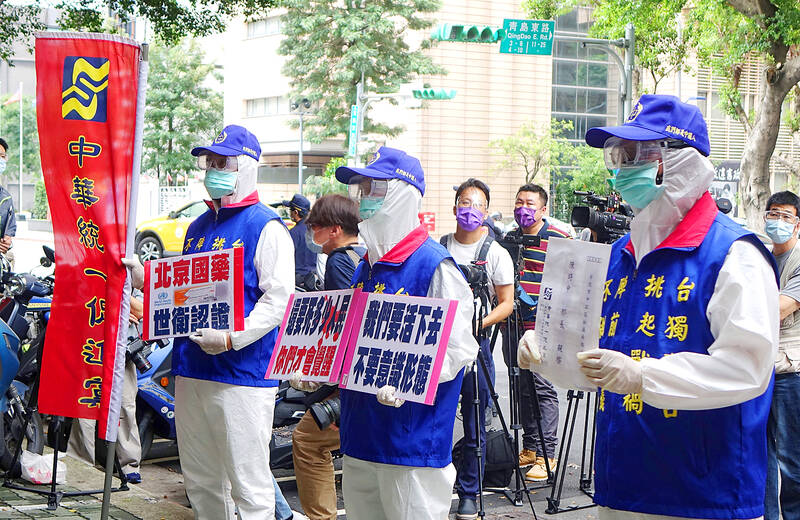The Ministry of the Interior on Thursday said it would ask the Constitutional Court to dissolve the China Unification Promotion Party (CUPP).
The ministry in a statement said that its Political Party Review Committee approved a resolution to seek the dissolution of the New Taipei City-based CUPP with a required two-thirds vote after inviting the party’s leadership to make a statement in its defense.
The ministry said that the party is known to be involved in organized crime, and has core members who have “repeatedly” contravened the National Security Act (國家安全法), the Anti-Infiltration Act (反滲透法), the Act Governing Relations Between the People of the Taiwan Area and the Mainland Area (臺灣地區與大陸地區人民關係條例) and election laws, thus “endangering national security, social stability and fair elections.”

Photo: Liu Hsin-de, Taipei Times
While the ministry “respects” the political stances of the CUPP, it “cannot accept” repeated national security breaches and acts of violence by party members, the statement said.
The CUPP’s “links to foreign forces” and “use of a political party name as a cover for organized crime,” among other things, contravene the Constitution and laws, even if the party does not hold any seats in the legislature, or in any city or county councils, it said.
Under the Constitution authorities can request the dissolution of a political party whose “goals or activities endanger the existence of the Republic of China or the nation’s free and democratic constitutional order,” the ministry said.
The ministry acknowledged that its request might be complicated by an ongoing political dispute over Constitutional Court vacancies and a reform bill, which has left the court’s operations in a cloud of uncertainty.
A request to disband the CUPP would be submitted as soon as the court’s situation permits, the ministry said.

INVESTIGATION: The case is the latest instance of a DPP figure being implicated in an espionage network accused of allegedly leaking information to Chinese intelligence Democratic Progressive Party (DPP) member Ho Jen-chieh (何仁傑) was detained and held incommunicado yesterday on suspicion of spying for China during his tenure as assistant to then-minister of foreign affairs Joseph Wu (吳釗燮). The Taipei District Prosecutors’ Office said Ho was implicated during its investigation into alleged spying activities by former Presidential Office consultant Wu Shang-yu (吳尚雨). Prosecutors said there is reason to believe Ho breached the National Security Act (國家安全法) by leaking classified Ministry of Foreign Affairs information to Chinese intelligence. Following interrogation, prosecutors petitioned the Taipei District Court to detain Ho, citing concerns over potential collusion or tampering of evidence. The

Seventy percent of middle and elementary schools now conduct English classes entirely in English, the Ministry of Education said, as it encourages schools nationwide to adopt this practice Minister of Education (MOE) Cheng Ying-yao (鄭英耀) is scheduled to present a report on the government’s bilingual education policy to the Legislative Yuan’s Education and Culture Committee today. The report would outline strategies aimed at expanding access to education, reducing regional disparities and improving talent cultivation. Implementation of bilingual education policies has varied across local governments, occasionally drawing public criticism. For example, some schools have required teachers of non-English subjects to pass English proficiency

NEGOTIATIONS: The US response to the countermeasures and plans Taiwan presented has been positive, including boosting procurement and investment, the president said Taiwan is included in the first group for trade negotiations with the US, President William Lai (賴清德) said yesterday, as he seeks to shield Taiwanese exporters from a 32 percent tariff. In Washington, US Trade Representative Jamieson Greer said in an interview on Fox News on Thursday that he would speak to his Taiwanese and Israeli counterparts yesterday about tariffs after holding a long discussion with the Vietnamese earlier. US President Donald Trump on Wednesday postponed punishing levies on multiple trade partners, including Taiwan, for three months after trillions of US dollars were wiped off global markets. He has maintained a 10 percent

TRADE: The premier pledged safeguards on ‘Made in Taiwan’ labeling, anti-dumping measures and stricter export controls to strengthen its position in trade talks Products labeled “made in Taiwan” must be genuinely made in Taiwan, Premier Cho Jung-tai (卓榮泰) said yesterday, vowing to enforce strict safeguards against “origin laundering” and initiate anti-dumping investigations to prevent China dumping its products in Taiwan. Cho made the remarks in a discussion session with representatives from industries in Kaohsiung. In response to the US government’s recent announcement of “reciprocal” tariffs on its trading partners, President William Lai (賴清德) and Cho last week began a series of consultations with industry leaders nationwide to gather feedback and address concerns. Taiwanese and US officials held a videoconference on Friday evening to discuss the